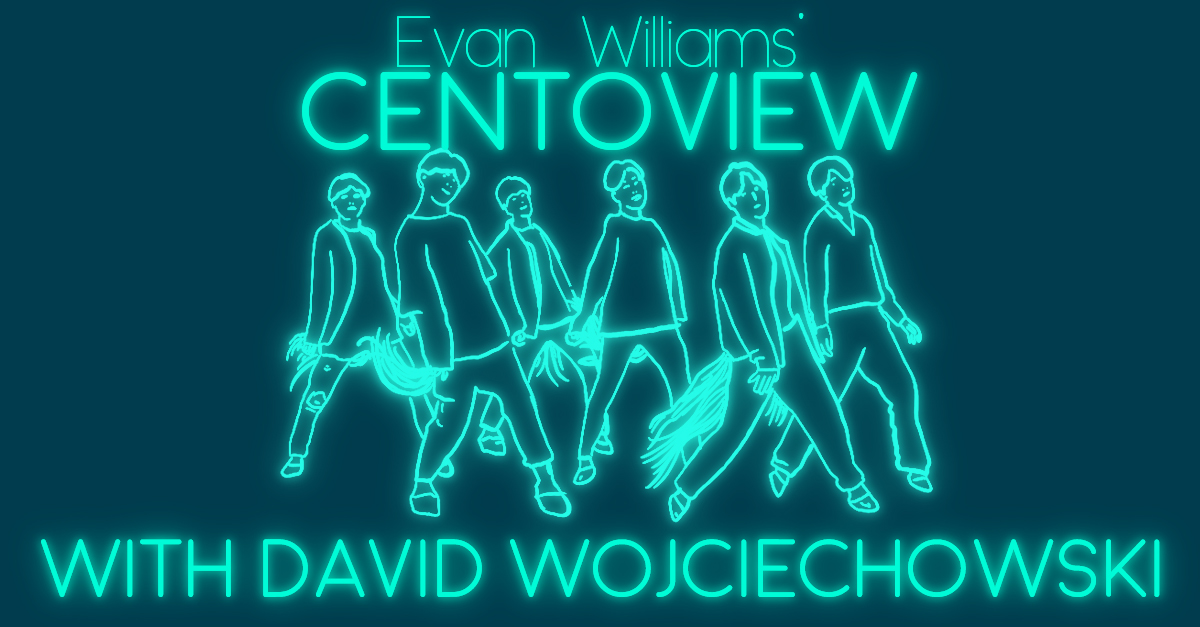
Evan Williams
Evan Williams is a Chicago-based writer thinking about surrealism and the Anthropocene. His work appears in DIAGRAM, Pleiades, and the Bennington Review, among others. He is the author of “Claustrophobia, Surprise!” (HAD Chaps, 2022), the Reviews Editor at X-R-A-Y Lit, and one-third the editorial brain behind the temporary journal of prose poetry, Obliterat.

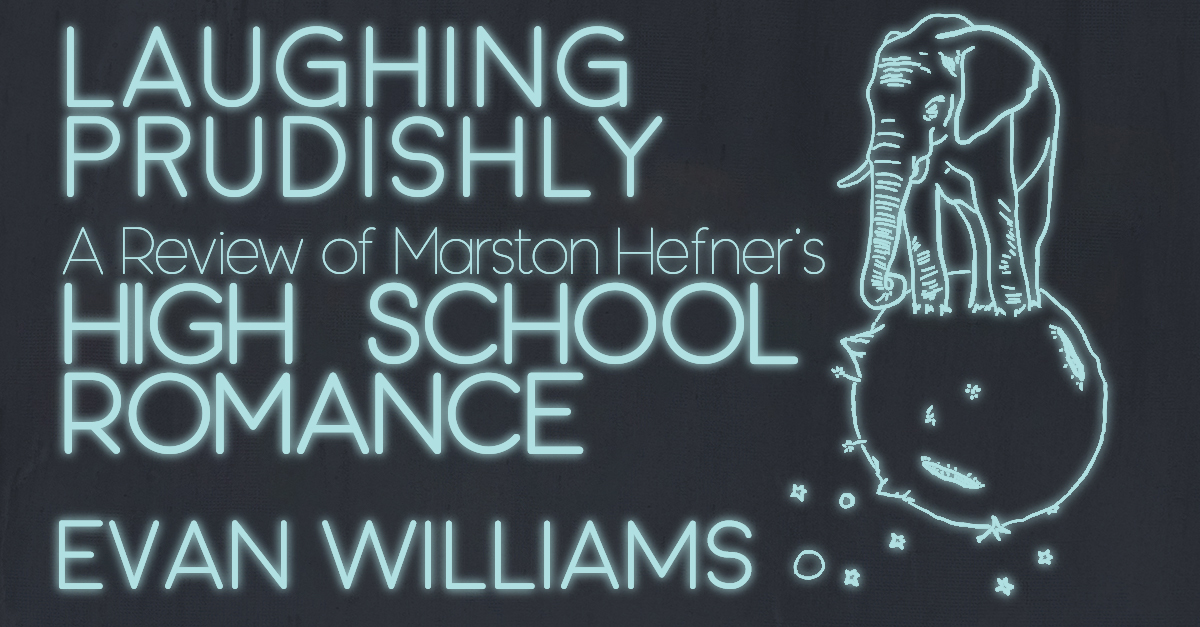
LAUGHING PRUDISHLY; A REVIEW OF MARSTON HEFNER’S “HIGH SCHOOL ROMANCE” by Evan Williams
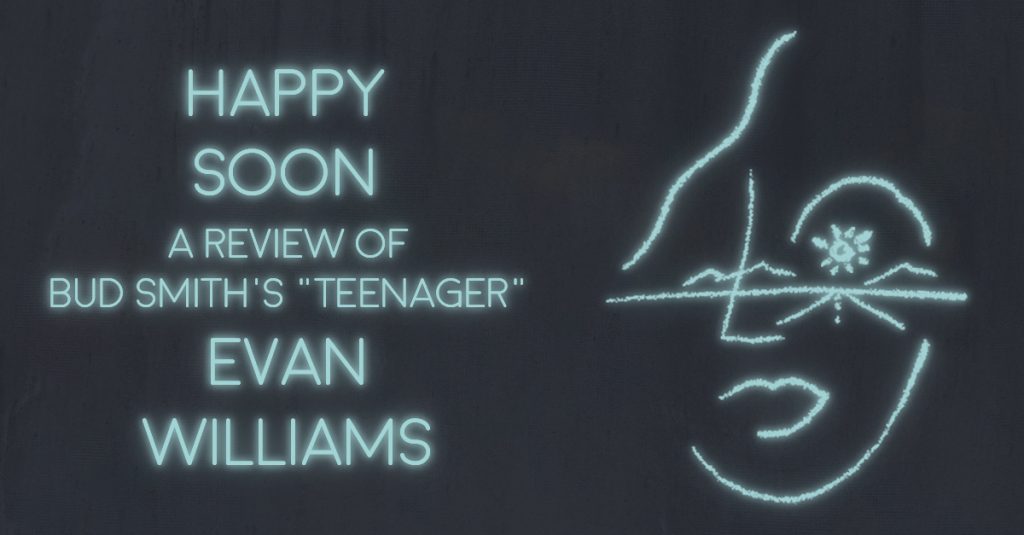
HAPPY SOON; A REVIEW OF BUD SMITH’S “TEENAGER” by Evan Williams
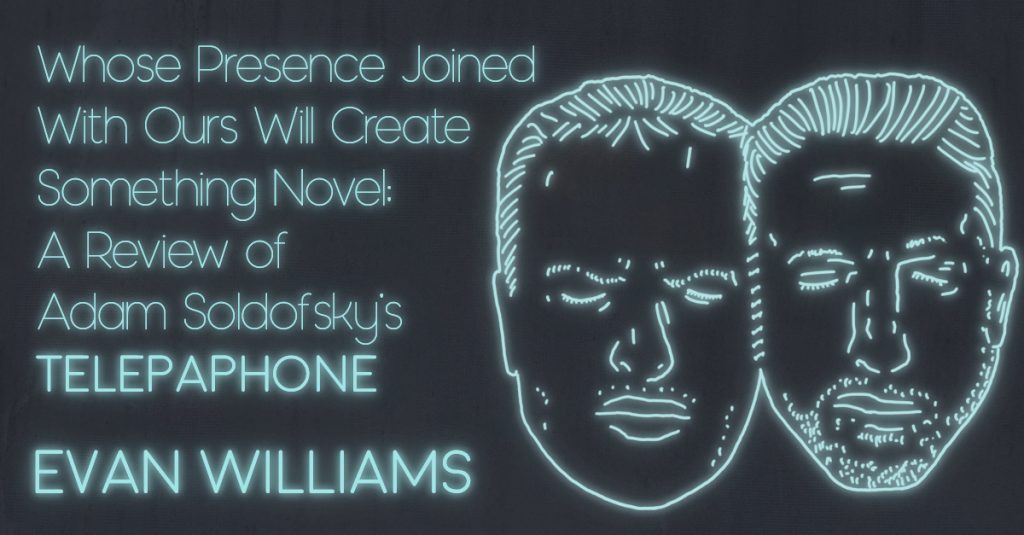
Whose Presence Joined With Ours Will Create Something Novel; A Review of Adam Soldofsky’s TELEPAPHONE by Evan Williams
Take any version of the movie Freaky Friday. Now imagine it remade as a film noir. Now imagine it was written by Marshall McLuhan. Now imagine it isn’t afraid to lean into the philosophical implications a body swap has on the nature of selfhood. Congratulations, you’ve got Adam Soldofsky’s Telepaphone.
My first impulse upon reading the title was to rummage through my shelves for Mag Gabbert’s MINML POEMS, a book taking the torch of condensed wordplay from Aram Saroyan. The word “telepaphone” feels like it might fit in among Gabbert’s poems, sandwiched somewhere between “anammal” and “implocean.” While reading MINML POEMS I made a game of dissecting Gabbert’s pieces into their possible constitutive parts, beginning with the obvious combinations and extending outwards. What becomes clear in this practice is not only that the meaning of the poem can drastically change depending on its compositional permutation, but that the meaning of its individual components can be inflected in one direction or another by its partner(s); as one piece changes, so do the rest, so does the whole.
Motivational speaker Jim Rohn once argued that we are the average of the five people with whom we spend the most time. This idea supposes that our social surroundings construct us, though it elides, or, at minimum de-emphasizes our agency in the process. Our sense of self is not constructed for us, but by us, through and against those with whom we interact. Soldofsky approaches this idea, one of definition by inflection, and emphasizes not only the inflection itself, but its mode: the titular gadget, the telepaphone.
Described as “an amateur magician’s apparatus that, when worn by two individuals” might “facilitate telepathic communication,” the device is one that, on its face, allows for an intimate knowledge of another; it allows for a deeper, more genuine sort of inflective interaction.
The novella’s plot quickens when Adam Soldofsky—a failing-if-not-already-failed artist in a marriage brought to its deathbed by his alcoholism—and Axel Wilhite—an internationally-renowned artist with whom Adam attended art school—test the telepaphone. The machine’s instructions require the pair to sit facing with headsets “snug but unrestrictive,” set “about the crown of the head with the skull carapace sitting atop the head like a ballcap.” It’s worth noting that by this point in the book, the friendship between Adam and Axel is withering, if not spoiled. The meeting which has brought them to this moment was predicated upon Adam’s emotional decline, Axel visiting in the hopes of helping, or at least assessing its severity; the precipitant for the ensuing inflection of Axel on Adam, Adam on Axel, is one of imbalance. And, ultimately, a further imbalance is achieved: the telepaphone overshoots the mark, catapulting them past mere telepathy into a full blown body swap.
I won’t spoil the plot further but to say drama and dark hilarity ensues.
At the heart of any good body swap plot is the idea that having learned what another’s life is like, one walks away not only with greater appreciation for their own, but with an enlightened understanding of the daily hardship of their peer, and this is certainly true of Telepaphone. What is not common in the body swap genre, and what makes Soldofsky’s work so gripping conceptually and in its execution is its exploration of the leftover self, which borders on an assertion of an essential self.
What’s left of another person if your consciousness now resides within them? Their dreams, their muscle memory. Sporadically throughout the course of the story, Adam—in Axel’s body—falls asleep, launching into one of Axel’s dreams. When this happens, it’s not immediately clear in the text. Mostly, it is a seamless transition from Adam’s wakeful observations into his experience of Axel’s dreams, which he observes and comments upon as though he were outside of them. It’s in these moments that Telepaphone articulates most clearly the intimacy of a friendship—one brought on by despair, misfortune, and technological mishap. It’s tempting to argue that Soldofsky’s thesis is one aimed at touting the power of misery to bind.
It isn’t just a binding, however, just as sewing together the bits of two or more words into a single, condensed poem isn’t just a binding, it’s a generative act; the bits, linked together, allow for a new and surprising form to come forth.
As is established early on, Adam and Axel first found one another in art school, going on to achieve wildly different degrees of success. Adam painting in Adam’s body results in Adam’s work; Axel painting in Axel’s body results in Axel’s work; Adam painting in Axel’s body results in a fusion of taste, technique, and vision. It creates something not only wholly new, but something representative of the pair’s inflection of one another.
This is the point from which the potency of Soldofksy’s novella stems. Snared in the logistics of the body swap is the surface-level but often obscured fact that a body swap is fundamentally the creation of two new lives. Further, if we construct ourselves against those around us, then not only does the body swap afford its participants the opportunity to construct a renewed sense of self against their swap-ee, but, disembodied, they might form it against themselves as well. Intimacy brings forth new form. It’s this that Soldofsky both fears and celebrates, the harrowing trials it may involve, and the selfishness we must break past to give over our whole being to another.
I took it upon myself to dissect the word telepaphone as I dissected Gabbert’s poems. Yes, it is most likely that the word is simply a combination of telepathy and phone, evoking the sound of the word telephone as an added bonus. However, mirroring the definition of the self and the social network in which it operates, the book takes on new meaning as its constitutive parts change. Having spent far too much time considering the contributions of an assortment of possible words based on telepaphone’s syllabic makeup, and even testing out a few acronyms, I came finally to two alternative possibilities:
Telegenetic past phoneTeleological partner phone
I won’t decide between the two which is the right one, there is no wrong answer. If the first, Soldofsky has painted an elaborate portrait of our past—social, intellectual, emotional, etc—lives as being additives to not only our way of perceiving the world, but to our cellular composition. It is an articulation of the belief that that material is transmissible in a tangible fashion. If the second, then we need not worry. Body swap or not, there’s another we’re moving toward, another who will someday sit facing us, and whose presence joined with ours will create something novel.
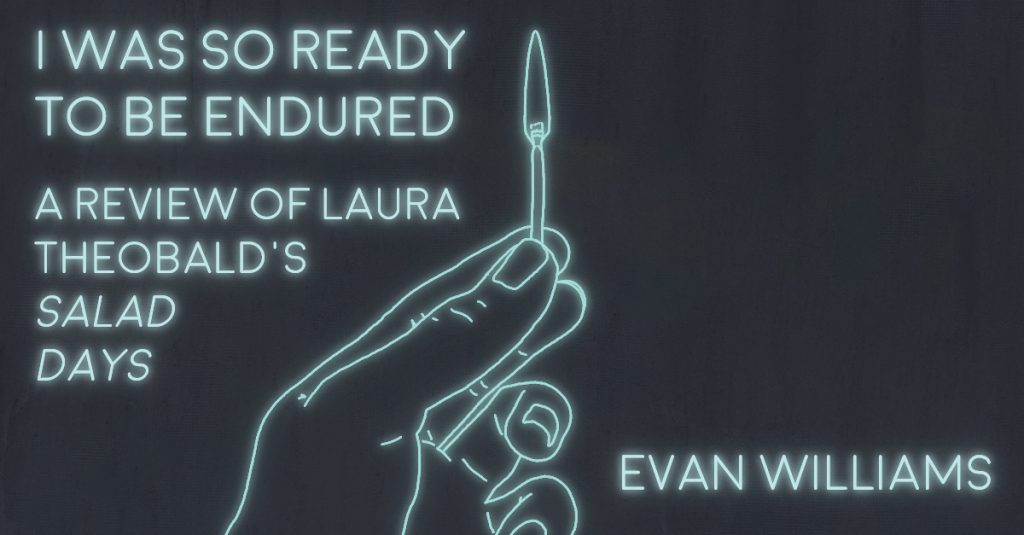
I WAS SO READY TO BE ENDURED: A REVIEW OF LAURA THEOBALD’S SALAD DAYS by Evan Williams
Laura Theobald opens her new collection Salad Days with an epigraph from Antony and Cleopatra. Fitting. This book is an acerbic wedding, rejoicing in the union of our worst impulses and their natural consequences. Everyone is dressed to celebrate, except we’re alone. So, so alone.
To be forthright, I had no idea what to make of Salad Days initially. I read the epigraph and thought, “Ah, destructive love, imperial curiosity.” I read the index, where I found the book split into seven spectacularly-titled sections: Waves of Confusion, Art for the Afterlife, Moon Unit, Future Moods, Double Fantasy, Sour Times, and Infinite Sadness. I read the book a section a day.
In the first line of the first poem I encountered a “you” and felt safe in the embrace of what I first guessed to be love poems. Then there’s this line, from Fish Poem, that goes like “I was so ready to be endured.” It’s here that I became pretty sure these were not love poems, but anti-love poems, which are as loving as love poems because they are not breakup poems. And, because they are not breakup poems, they imply a hanging on; this realization made me afraid.
I was afraid because I was settled into and inseparable from a book, to quote from Art Poem, so totally “invested in a life of destruction.” I bailed on my plan to read the book section by section, started over at the beginning, then read the whole thing in a sitting. It’s a whirlwind, I suggest you do the same if you’re able.
The narrator’s desire to impose themselves, to be endured, is never really directed at an agent to do the enduring beyond an implicit “you,” and so the narrator has allowed themselves a space to be endured by everything, starting with the “you” of these poems. What’s clear though, is that imposition is synonymous in the text with expenditure; imposing the self is to offer oneself up for annihilation, and it’s sort of thrilling. It comes through in the structure of every line, none of which close with end punctuation, and so always leave off waiting for another line to carry them. Most, if not all, of the poems read like couplets where any line can be the first half and any line can be the second. Even those poems with an odd number of lines give this impression, articulating subtly the possibility of devastation by asking formally: what if the second line to my couplet never shows up to build on my suggestion?
As the book builds on itself, the scale of the destruction in which it’s invested grows exponentially. We’re taken from the kitchen with its tomatoes and potatoes and fish, its ass and diamonds and islands and onions, to the sun and the empire, the clouds and the earth. In the transition there’s the rapidity of the narrator’s dissolution, and there is the exponentially growing scale of destruction won from each successive annihilation. Every time we are made to feel small, we make ourselves that much bigger so our destruction might be noticed.
And we are made to feel small. We are made to feel subject to—subject to another, subject to an empire, subject to the sun, subject to the cancer of both.
The crescendoing scope given over to the agent of our annihilation begins in Flowering Poem, where Theobald writes, “When you wake up you will think of me/But when you die you will think of something else.” It’s a brilliant couplet. The offer of the self (to be endured, that is being endured) to close the first line, then the turn toward a vague something else to close the second enacts precisely the sort of treachery of which every line in this book is wary. Then along comes Empire Poem to say: “You were my favorite empire/You had a voice like when the sun is setting.” Here’s the imperial curiosity. To be thought of when another wakes, to be dismissed when they go to sleep—it calls to mind the idea that the sun never set on the British Empire; if we seek to feel part of the empire’s light, we know already it will run away from us to shine somewhere else. Yet, the narrator speaks to the overarching sentiment of the book, saying, “I would like more time to look at the sun/The sun is totally without pretense/Shining its cancer onto everyone.” There’s almost an appreciation. Recalling the thesis of Potato Poem, “It happens fast/Like anything that is terrible,” it’s difficult not to believe that because we are here dying so slowly, being weaned drip by drip by drip of the selves we impose, maybe it’s not terrible, maybe it’s even lovely.
What’s being done, it’s all destruction. “It’s like lighting a match in a world with no wind/And you have to put the fire someplace/And where are you going to put the fire/And there is no place to put the fire.”
The collection concedes, those of us invested in this form of self-destruction concede, finally, with flair. “Yes yes yes everything is beautiful/with an expiration date.” Though, whether we’re meant to take our repose in the idea that living for destruction must come to an end, or that being endured without being destroyed can only go on for so long, I don’t know. And again, I am afraid.
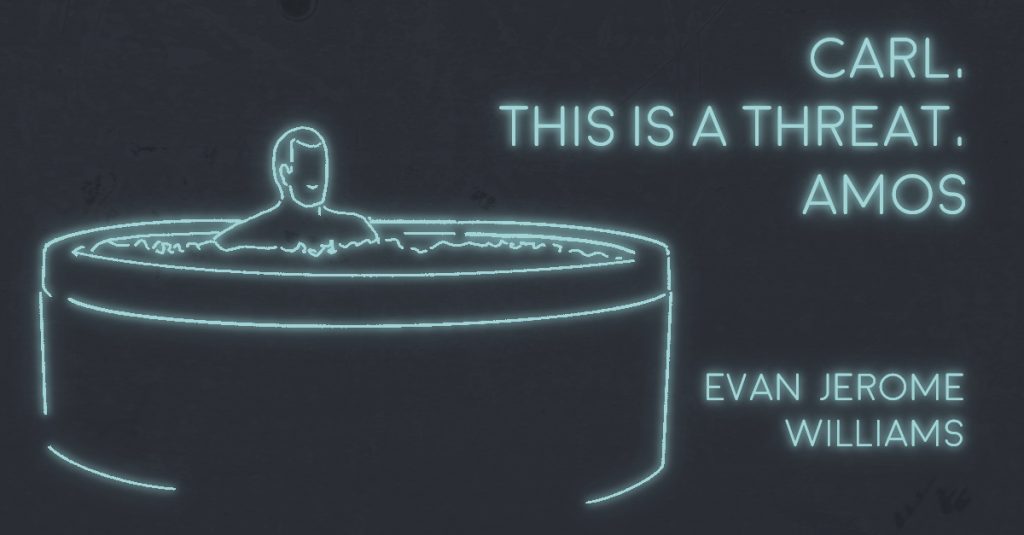
THREE MICROS by Evan Jerome Williams
Carl
Carl is a cobra with nine eyes. Carl has seven too many eyes, and none of them see well. He has difficulty finding eyeglasses that work for him on account of his extra eyes.
Carl needs eyeglasses to read. He is a scholar studying applied reptilian physics, a discipline primarily concerned with asteroid-detection and trajectory-disruption techniques. Carl needs eyeglasses so he can protect us.
Carl found an eye doctor who used to be a pirate. The eye doctor poked out seven of Carl’s eyes with precise stabbing motions, then made as many eyepatches with equal precision.
Carl looks like a badass. He has the right number of eyes for eyeglasses now. Carl is going to save the world.
This Is A Threat
I bought an orange sweater at the mall and decided to wear it to my dermatology appointment. Dermatologists study my skin because it is multi-layered, and that is unusual. They want to understand it. When I got there they asked me to take the sweater off. “Please, sir,” they said, “we need to see your layered dermis.” I couldn’t take it off. “I can’t,” I told them, “It’s a new layer of my skin.” I tugged at it. “See?” I said. They walked to the other side of the room to consult their notes. They consulted one another. They all nodded and came back. The dermatologists fanned out around me. “This is a threat,” they said. “Take off your sweater,” they said. “Take off your sweater so we can study you.” They anaesthetized me and peeled it like a sunburn.
Amos
Amos is a man I met in a hot tub. Famous. Famous Amos in a hot tub with me. This makes me famous. Amos says so, in the hot tub where we are both famous. Amos has cookie shorts. Chocolate chip, I think, or raisin. Raisin cookie shorts for Mr. Amos in the hot tub.
We are in Hawaii. I can’t remember if I mentioned that. Famous people are more common in places like Hawaii. Maybe I should omit this detail. Or alter it.
Amos is a man I met in a hot tub. Famous. Famous Amos in a hot tub with me. This makes me famous. Amos says so, in the hot tub where we are both famous. Amos has cookie shorts. Chocolate chip, I think, or raisin. Raisin cookie shorts for Mr. Amos in the hot tub.
The hot tub in Arkansas. Arkansas where few famous people are found at leisure. Arkansas, so unfamous as to be infamous for its unfamousness. Mr. Amos and I, famous, in the Arkansan hot tub. “Do you want some cookies?” he asks. “Yes I’d like that,” I answer.
